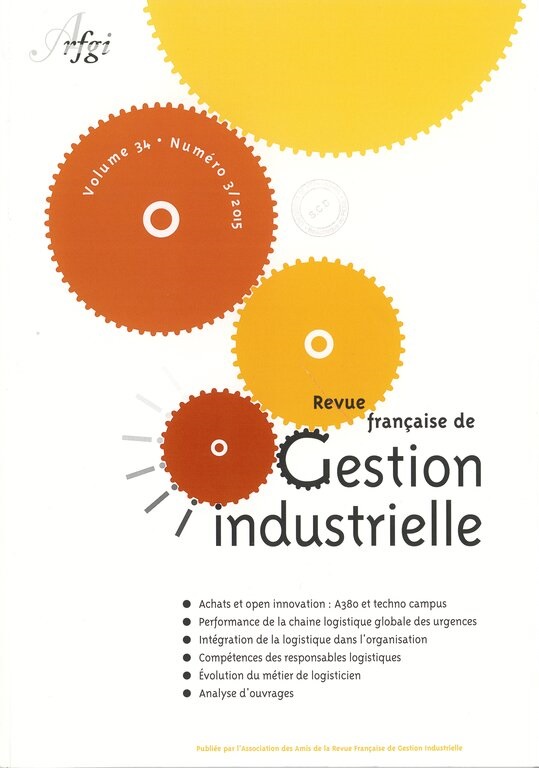Compétences des responsables logistiques : résultats d'une analyse longitudinale
DOI :
https://doi.org/10.53102/2015.34.03.868Mots-clés :
compétence, responsable logistique, enquête longitudinaleRésumé
Depuis plusieurs années les responsables logistiques doivent faire face à de nouvelles contraintes et de nouveaux enjeux qui viennent modifier la pratique de leur métier et, de ce fait, les compétences qu'ils doivent mobiliser. Ce papier se propose de mettre à jour et de compléter, dans une perspective longitudinale, une enquête menée en 2007 par Bironneau et Le Roy (2009) pour décrire les compétences clés dont doit disposer un responsable logistique. 11 montre que les compétences managériales sont cruciales, tout comme les compétences permettant la prise de décisions stratégiques.
Références
Bironneau, L., Le Roy, B., (2007), “Définition d'un modèle générique des besoins en compétences du responsable logistique”, Logistique et Management, vol.15, pp. 7-18. http://dx.doi.org/10.1080/12507970.2007.11516880
Bironneau, L., Le Roy, B., (2009), “Quelles compétences pour les responsables logistiques ? Résultats d’une enquête terrain”, Revue Française de Gestion Industrielle, volume 28, n°1, pp. 3-24.
Christopher, M., (2004), “Creating and Sharing Knowledge in Logistics: developing the Logistics Manager of the Future”, European Logistics Association Eurolog 2004 Conference, 12 juin, Budapest.
Christopher, M., (2005), Supply chain management - créer des réseaux à forte valeur ajoutée, Pearson - Village Mondial, Paris (3ème édition traduite de l’anglais).
Christopher, M., (2012), “Managing Supply Chain Complexity: Identifying the Requisite Skills”, Supply Chain Forum: An International Journal, Vol.13, No.2, pp. 4-9. https://doi.org/10.1080/16258312.2012.11517288
Christopher, M., Olweg, M., (2011), “Supply Chain 2.0 : Managing supply chains in the area of turbulence”, International Journal of Physical Distribution and Materials Management, Vol.41, n°1, p.63-82. http://dx.doi.org/10.1108/09600031111101439
Crum, M., Johnson, D.A., Allen, B.J., (1998), “A longitudinal assessment of EDI use in the US motor carrier industry”, Transportation Journal, Vol.38, n°1, pp. 15-28.
Dornier, P.P., (2006), « Pourquoi le supply chain management est-il devenu un enjeu si difficile à maîtriser ? ”, Réalités industrielles (Annales des Mines), mai, pp. 11-15.
Gammelgaard, B., Larson, P.D., (2001), “Logistics Skills and Competencies for Supply Chain Management”, Journal of Business Logistics, Vol.22, n°2, 2001, pp.27-49. https://doi.org/10.1002/j.2158-1592.2001.tb00002.x
Guinipero, L., Pillai, K.G., Chapman, S., Clark, R., (2005), “A longitudinal examination of JIT purchasing practices”, International Journal of Logistics Management, Vol. 16, n°1, pp. 51-70. http://dx.doi.org/10.1108/09574090510617358
Hegde, V., Radovilsky, Z., (2012), “Shift in Supply Chain job Requirements and its Impact of Supply Chain Management Curriculum”, Journal of the Academy of Business & Economics, Vol. 12 Issue 4, p28-38. 11p.
Livolsi, L., (2007), “Directeur et Responsable Logistique : différences et évolutions au travers des offres d’emploi publiées”, Logistique & Management, Vol. 15, n°2, pp. 19-29. http://dx.doi.org/10.1080/12507970.2007.11516881
Livolsi, L., (2011), “Profiling the job of a supply chain manager: a french case study”, Supply Chain Forum: An International Journal, vol. 14, n°4, p.54-63. http://dx.doi.org/10.1080/16258312.2011.11517273
Lorentz, H., Töyli, J., Solakivi, T., Ojala, L., (2013), “Priorities and determinants for supply chain management skills development in manufacturing firms”, Supply Chain Management, Vol. 18, n°4, pp. 358-375. http://dx.doi.org/10.1108/SCM-03-2012-0111
Mangan, J., Gregory, O., Lalwani, C., (2001), “Education, Training and the Role of Logistics Managers in Ireland”, International Journal of Logistics Research and Applications, Vol.4, n°3, p.313-327. http://dx.doi.org/10.1080/13675560110084120
Mangan, J., Christopher, M., (2005), “Management Development and the Supply Chain Manager of the Future”, The International Journal of Logistics Management, Vol. 16, n°2, pp.178-191. http://dx.doi.org/10.1108/09574090510634494
Mickael Page, (2011), Etude de fonctions et rémunération Logistique et Supply Chain,
http://www.michaelpage.fr/productsApp/etudes_rem/EDR_Logistique_SupplyChain.pdf
Murphy, P., Poist, R., (1991), “Skill Requirements of Senior-Level Logisticians: Practitioner Perspectives”, International Journal of Physical Distribution & Logistics Management, Vol.21 n°3, p.3-14. Cet article a été réédité dans la même revue en 1998, Vol.28, n°4, pp.284-301. https://doi.org/10.1108/09600039110004025
Murphy, P., Poist, R., (2006), “Skill Requirements of Contempory Senior- and Entry-Level Logistics Managers: a Comparative Analysis”, Transportation Journal, vol.45, n°3, pp. 46-60.
Murphy, P., Poist, R., (2007), “Skill Requirements of Senior-Level Logisticians : a Longitudinal Assessment”, Supply Chain Management : An International Journal, vol.12, n°6, p. 423-431. http://dx.doi.org/10.1108/13598540710826353
Myers, M., Griffith, D., Daugherty, P., Lusch, R., (2004), “Maximizing the Human Capital Equations in Logistics: Education, Experience and Skills”, Journal of Business Logistics, Vol.25, n°1, p.211-232. http://dx.doi.org/10.1002/j.2158-1592.2004.tb00175.x
Porter, M., (1986), L’avantage concurrentiel : comment devancer ses concurrents et maintenir son avance ?, Interéditions, Paris.
Razzaque, M., Bin Sirat, M.S., (2001), “Skill Requirements: Perceptions of the Senior Asian Logisticians”, International Journal of Physical Distribution & Logistics Management, vol.31,no5, pp.374-395. http://dx.doi.org/10.1108/09600030110395175
Stank, T., Poist R., Murphy P., (1998), “Personal Skills Development : a Missing Ingredient in Logistics Education”, Defense Transportation Journal, August, pp. 10-14.
Numéro
Comment citer
Rubrique
Licence
(c) Tous droits réservés Revue Française de Gestion Industrielle 2021

Ce travail est disponible sous licence Creative Commons Attribution - Pas d’Utilisation Commerciale 4.0 International.











